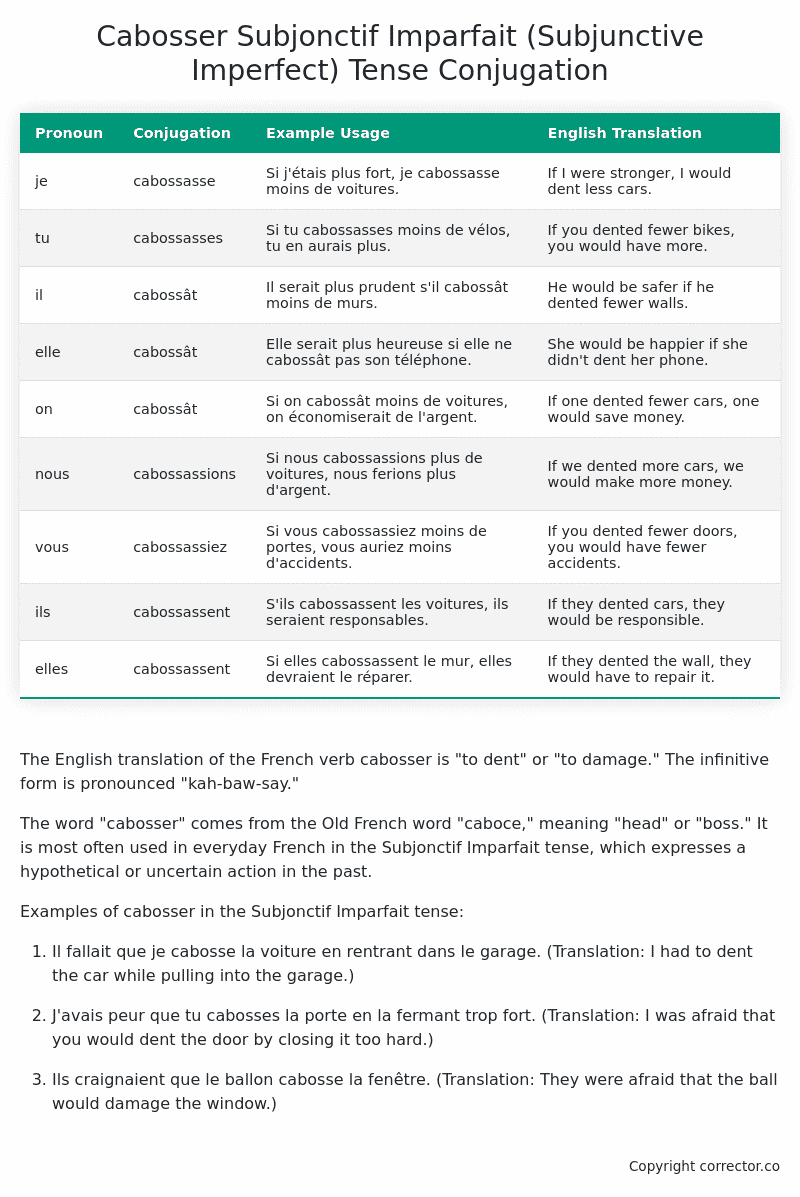Subjonctif Imparfait (Subjunctive Imperfect) Tense Conjugation of the French Verb cabosser
Introduction to the verb cabosser
The English translation of the French verb cabosser is “to dent” or “to damage.” The infinitive form is pronounced “kah-baw-say.”
The word “cabosser” comes from the Old French word “caboce,” meaning “head” or “boss.” It is most often used in everyday French in the Subjonctif Imparfait tense, which expresses a hypothetical or uncertain action in the past.
Examples of cabosser in the Subjonctif Imparfait tense:
-
Il fallait que je cabosse la voiture en rentrant dans le garage.
(Translation: I had to dent the car while pulling into the garage.) -
J’avais peur que tu cabosses la porte en la fermant trop fort.
(Translation: I was afraid that you would dent the door by closing it too hard.) -
Ils craignaient que le ballon cabosse la fenêtre.
(Translation: They were afraid that the ball would damage the window.)
Table of the Subjonctif Imparfait (Subjunctive Imperfect) Tense Conjugation of cabosser
| Pronoun | Conjugation | Example Usage | English Translation |
|---|---|---|---|
| je | cabossasse | Si j’étais plus fort, je cabossasse moins de voitures. | If I were stronger, I would dent less cars. |
| tu | cabossasses | Si tu cabossasses moins de vélos, tu en aurais plus. | If you dented fewer bikes, you would have more. |
| il | cabossât | Il serait plus prudent s’il cabossât moins de murs. | He would be safer if he dented fewer walls. |
| elle | cabossât | Elle serait plus heureuse si elle ne cabossât pas son téléphone. | She would be happier if she didn’t dent her phone. |
| on | cabossât | Si on cabossât moins de voitures, on économiserait de l’argent. | If one dented fewer cars, one would save money. |
| nous | cabossassions | Si nous cabossassions plus de voitures, nous ferions plus d’argent. | If we dented more cars, we would make more money. |
| vous | cabossassiez | Si vous cabossassiez moins de portes, vous auriez moins d’accidents. | If you dented fewer doors, you would have fewer accidents. |
| ils | cabossassent | S’ils cabossassent les voitures, ils seraient responsables. | If they dented cars, they would be responsible. |
| elles | cabossassent | Si elles cabossassent le mur, elles devraient le réparer. | If they dented the wall, they would have to repair it. |
Other Conjugations for Cabosser.
Le Present (Present Tense) Conjugation of the French Verb cabosser
Imparfait (Imperfect) Tense Conjugation of the French Verb cabosser
Passé Simple (Simple Past) Tense Conjugation of the French Verb cabosser
Passé Composé (Present Perfect) Tense Conjugation of the French Verb cabosser
Futur Simple (Simple Future) Tense Conjugation of the French Verb cabosser
Futur Proche (Near Future) Tense Conjugation of the French Verb cabosser
Plus-que-parfait (Pluperfect) Tense Conjugation of the French Verb cabosser
Passé Antérieur (Past Anterior) Tense Conjugation of the French Verb cabosser
Futur Antérieur (Future Anterior) Tense Conjugation of the French Verb cabosser
Subjonctif Présent (Subjunctive Present) Tense Conjugation of the French Verb cabosser
Subjonctif Passé (Subjunctive Past) Tense Conjugation of the French Verb cabosser
Subjonctif Imparfait (Subjunctive Imperfect) Tense Conjugation of the French Verb cabosser (this article)
Subjonctif Plus-que-parfait (Subjunctive Pluperfect) Tense Conjugation of the French Verb cabosser
Conditionnel Présent (Conditional Present) Tense Conjugation of the French Verb cabosser
Conditionnel Passé (Conditional Past) Tense Conjugation of the French Verb cabosser
L’impératif Présent (Imperative Present) Tense Conjugation of the French Verb cabosser
L’infinitif Présent (Infinitive Present) Tense Conjugation of the French Verb cabosser
Struggling with French verbs or the language in general? Why not use our free French Grammar Checker – no registration required!
Get a FREE Download Study Sheet of this Conjugation 🔥
Simply right click the image below, click “save image” and get your free reference for the cabosser Subjonctif Imparfait tense conjugation!

Cabosser – About the French Subjonctif Imparfait (Subjunctive Imperfect) Tense
Formation
Common Everyday Usage Patterns
Interactions with Other Tenses
Subjonctif Présent
Indicatif Passé Composé
Conditional
Conditional Perfect
Summary
I hope you enjoyed this article on the verb cabosser. Still in a learning mood? Check out another TOTALLY random French verb conjugation!


